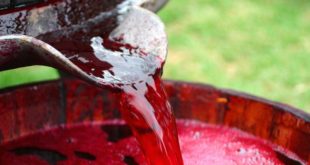The best method of making these wines is to put in the pips dry, when the fermentation of the wine has subsided. This method is preferred for two reasons: first, it may be performed at any time of the year when lemons are cheapest, and when other wine is making; second, all waste of the pips is avoided. Being light, they are sure to work over if put in the cask while the wine is in a state of fermentation. Boil fourteen pounds of good moist sugar with five gallons of water, and one ounce of hops. Shave thin the rinds of eight lemons or Seville oranges, or part of each; they must be put in the boil the last quarter of an hour, or the boiling liquor poured over them. Squeeze the juice to be added when cool, and rinse the pulp in the hot liquor, and keep it filled up, either with wine or new beer, as long as it works over; then paste brown paper, and leave it for four, six, or eight months. The quantity of flowers is one quart of flowers to each gallon of wine. Let them be gathered on a fine, dry day, and carefully picked from every bit of stalk and green. Spread them thinly on trays, sheets, or papers, and turn them often. When thoroughly dry put them in paper bags, until the wine is ready to receive them. Put them in at the bung-hole; stir them down two or three times a day, till all the cowslips have sunk; at the same time add isinglass. Then paste over gain with paper. In six months the wine will be fit to bottle, but will be improved by keeping longer in the cask. The pips shrink into a very small compass in drying; the quantity allowed is of fresh-gathered flowers. Observe, also, that wine well boiled, and refined with hops and isinglass, is just as good used from the cask as if bottled, which is a great saving of time and hazard. Wine made on the above principles has been often praised by connoisseurs, and supposed to have been bottled half a day.
 Pasteur Brewing Louis Pasteur – Science, Health, and Brewing
Pasteur Brewing Louis Pasteur – Science, Health, and Brewing 